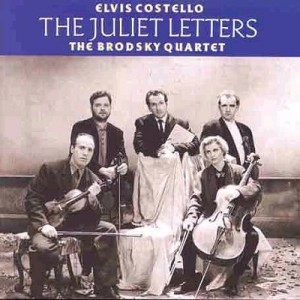
Elvis Costello Posing With The Brodsky Quartet
It might seem incredible, but it is actually possible to pinpoint the moment Costello’s career went into definitive artistic overdrive. The year was 1993, and he released a full-length CD devoted to chamber music where the instrumental backing was solely provided by the Brodsky Quartet.
Costello learned to write and read music right there and then, and the decade was to be his most adventuresome ever. And believe me, that is quite frankly saying an enormity if we look at his previous output. During the 90s and right into the new millennium he was to release an album of undiluted pop with 60s stalwart Burt Bacharach, a country album (The Delivery Man), an album dominated by ballads (All This Useless Beauty), an orchestrated work named Il Sogno… and the rock and roll albums he did release were not up to his usual standards (When I Was Cruel), as if he had just outgrown the genre. He was to become acquainted with it once again in 2008 with the release of Momofuku. But the previous decade was to be a true creative windmill on the other side of the grass.
Curiously enough, the album that set the spark to the flame is not a rewarding listen. The Juliet Letters takes the form of a concept album constituted by songs in the shape of letters. The effort that went into crafting the songs is admirable. Costello and the Brodskys must have sensed that the conceit could grow repetitive very quickly if they were not careful enough, and so they came up with letters of every type – love letters, a suicide letter, a junk mail offer, a letter from a soldier in the line of duty…
Still, the album is monotonous. The best songs on it do work (and quite splendidly, I must add) if you take them on their own. Just listen to the two which are embedded below:
The same goes for the one found on “Extreme Honey”, as “The Birds Will Still Be Singing” occupies a privileged place within that collection.
I wouldn’t be surprised if Costello ever said that this album is among the ones he is the fondest of. Even then, I am sure the value he places on it goes beyond how listenable it truly is. The CD gave him a new artistic horizon. Someone who was always so concerned about going one step beyond couldn’t have found a better vehicle for realizing what might have gone unheeded otherwise. For the listener, though, The Juliet Letters is frequently exhausting and occasionally striking. These moments are too far and few between to make it a mandatory purchase. But they are sparkling enough, especially when listened to separately. “Jacksons, Monks & Rowe”, “I Almost Had A Weakness”, “For Other Eyes”… these are startling songs about the human condition. Just make sure you listen to them in an individual context. Then, sitting through the whole album could be easier.
Rating: 5.5/10

Pingback: Extreme Honey (Elvis Costello) – Compilation Album | MusicKO
Pingback: Mighty Like A Rose (Elvis Costello) – Album Review | MusicKO
Pingback: Brutal Youth (Elvis Costello) – Album Review | MusicKO
Pingback: Teatro Triste del Clown » Blog Archive » 2629. “Deliver Us” by Elvis Costello; Brodsky Quartet
Pingback: Free Uruguayan Music For Download – “OVNI” By Matías Singer | MusicKO